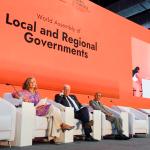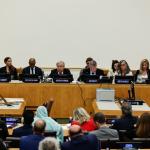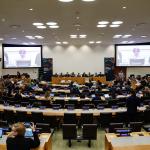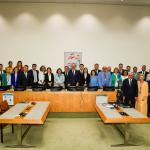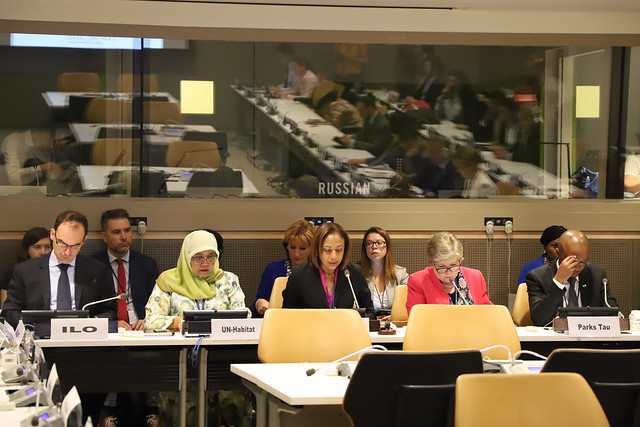
During the 2019 HLPF the constituency of Local and Regional Governments held a Local and Regional Governments Day prior to the Local 2030 Event. The Statement of the Local and Regional Governments constituency to the 2019 HLPF was further adopted by the delegation during the day, and the Global Taskforce launched the third Local and Regional governments’ Report to the HLPF, which was presented to the President of the General Assembly.
The constituency of local and regional governments shared the sense of urgency expressed by the United Nations Secretary General Antonio Guterres regarding the achievement of the goals, as well as the shared responsibility towards their communities to achieve the goals.
The statement of the constituency commended the expanding movement towards the localization of the global agendas as a testimony to its commitment and the communities that it represents. It further expressed the commitment of local and regional governments to play “a leadership role in the achievement of the 2030 Agenda”, and to reinforce the synergies among the global development agendas to ensure they are met as one in order to transform the world. To accelerate the implementation of the 2030 Agenda, it is integral to reinforce the synergies with the Addis Ababa Action Agenda, and the Paris Agreement, and to move forward with the realization of gender equality and the empowerment of women to transform our world.
The constituency further showcased how local and regional governments were already taking matters into their own hands and working to achieve the SDGs in cities and regions. The statement addressed how local and regional governments were at the forefront of climate action and the achievement of the Paris Agreement (SDG13), highlighted their work in ensuring quality education through public service provision (SDG 4), the role local and regional governments play in reducing inequalities through more inclusive urban design and mainstreaming the principle of the right to the city through city networks (SDG 10).
The statement addressed how local and regional governments are working to enable decent work in their territories to leave no-one behind in their communities and highlighted their role as procurers of services and local employers (SDG8), and stated that promoting peace and coexistence in local community, as well as accessing justice for all was integral to develop peaceful societies (SDG16).
The constituency of local and regional governments also expressed the need to be consulted regularly, and to upscale the involvement of local and regional governments in the monitoring and reporting of the Global Agendas, by supporting Voluntary Local Reviews, if we are to achieve SDG 17 and accelerate the partnerships for the global goals.
The statement reinstates the commitment of our constituency to further the localization agenda, building on the ambitious Seville Commitment that calls to cement a global-local movement to achieve the SDGs, and to foster dialogue among all stakeholders.
To achieve this local-global movement, however, the statement called on national governments and international institutions to embolden their ambitions and upscale efforts to allow for greater cooperation, and demand the national and international coordination mechanisms, as well as enough resources, to be put in place to make this possible.
Looking towards the SDG Summit and Beyond:
The upcoming SDG Summit is the first of its kind to take place after the adoption of the 2030 Agenda and the Sustainable Development Goals, to call for accelerated implementation in order to achieve the goals. The SDG Summit will allow our constituency to call for the mobilization of adequate financing to bolster local action, and to consolidate the Local and Regional Governments Forum as a space for dialogue among local and regional governments, national governments, and the UN system.Local and regional governments are indispensable for SDG implementation, and it is essential for the international community to see us as partners for transformation to achieve the global goals. Entering the next decade with a focus on implementation from the bottom-up will be integral to leave no-one and no place behind.
Further information:
- Read the Statement of the Local and Regional Governments' Constituency
- See the highlights of the Local and Regional Governments' Constituency presence at the 2019 HLPF

